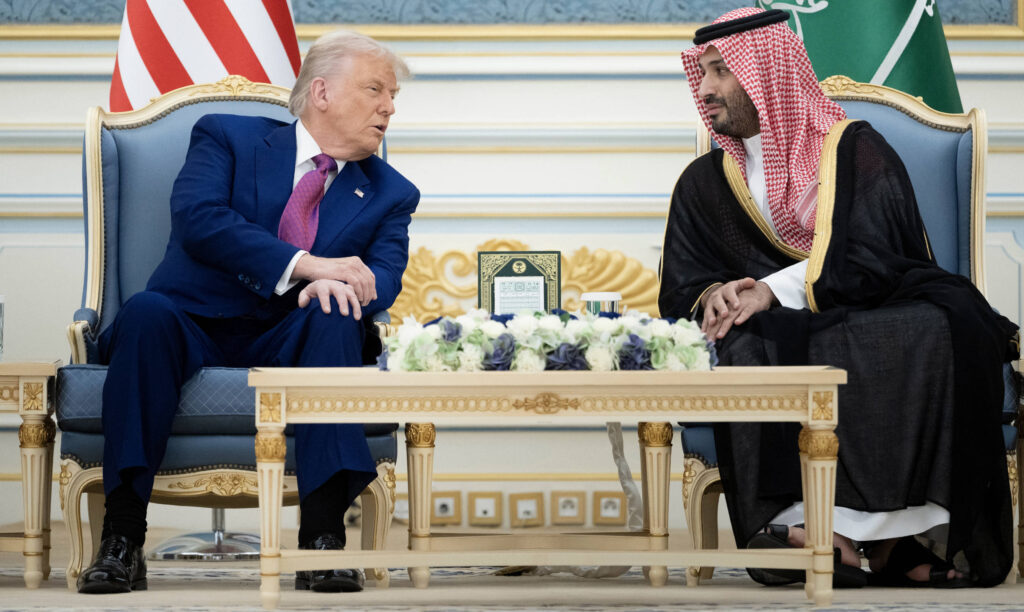US President Donald Trump signed a $142bn defense sales agreement in Saudi Arabia on Tuesday as he continued to push the kingdom to pour a trillion dollars of investment into his country.
Trump, who was treated to an escort of several Saudi F-15 fighter jets upon his arrival, had been pushing Crown Prince Mohammed bin Salman to up a previously promised $600bn investment to an eye-watering $1 trillion.
The new arms deal, which includes exports of GE gas turbines and energy solutions totaling $14.2bn and Boeing 737-8 passenger aircraft totaling $4.8bn, goes some way towards fulfilling that aim.
One Saudi Arabian company also plans on to invest $20bn in AI-related sites in the United States, the White House said on Tuesday.
Mohammed bin Salman and Trump were scheduled to meet for lunch at the royal palace on Tuesday, attended by several major American business leaders, including far-right Trump ally Elon Musk.
New MEE newsletter: Jerusalem Dispatch
Sign up to get the latest insights and analysis on
Israel-Palestine, alongside Turkey Unpacked and other MEE newsletters
The president is then set to travel to neighbouring Qatar and the United Arab Emirates.
A senior US official also confirmed that Trump “agreed to greet” Syrian interim President Ahmad al-Sharaa on Wednesday while in Riyadh.
During his meetings with Riyadh, Doha and Abu Dhabi, Trump is expected to announce contracts in everything from defence and aviation to energy and AI.
Saudi Arabian firm DataVolt “is moving forward with plans to invest $20 billion in AI data centres and energy infrastructure in the United States”, the White House announced on Tuesday, shortly after it said they had inked the $142bn arms deal.
“The United States and Saudi Arabia signed the largest defence sales agreement in history – nearly $142 billion, providing Saudi Arabia with state-of-the-art warfighting equipment,” it also said.
A letter of intent was also announced “to complete work and enhance joint cooperation on ammunition, training, support services, maintenance, system upgrades, spare parts and education for land and air systems of the National Guard”.
Another was announced regarding “the development of the health capabilities of the Saudi armed forces”.
Financial turmoil
Trump’s imposition of wide-ranging tariffs across the world has thrown economic confidence in the US into doubt and the president is seeking some headline-grabbing wins.
As Trump puts sales numbers ahead of traditional policy considerations, it is irking longstanding allies who are accustomed to having a de facto veto over sales.
The Trump administration signalled in April that it had shifted from viewing the sale of civilian nuclear technology to Saudi Arabia as a lever to entice Riyadh to normalise ties to Israel.
Instead, it is a business transaction that could give US companies a slice of the $80bn that experts say the kingdom’s nuclear programme would cost.

From AI to weapons, Trump’s Gulf visit looks to swap politics for business
Read More »
The same goes for the sale of F-35 jet fighters to Saudi Arabia. Reuters first reported that the US would discuss the sale with the kingdom, and an American official confirmed to Middle East Eye this week that it was on the table.
That deal would unnerve Israel because the sale of the US’s most advanced jet fighters was intended to be linked to the kingdom normalising relations with Israel under the Biden administration. But normalisation has been struck from the agenda for this trip.
Israel has long enjoyed outsized influence over the US’s arms sales to Arab states and Turkey.
The US’s commitment to Israel’s so-called qualitative military edge over its neighbours is written into law and has been a bedrock of the two countries’ partnerships, going back to the 1970s.
Regional rival Iran is also likely to feature prominently during Trump’s visit to Saudi Arabia, following a fourth round of talks in Oman at the weekend.
Both sides have expressed optimism but the US nonetheless on Monday imposed fresh sanctions targeting Iran’s nuclear programme.
The return to negotiatons have seen a rift between Trump and his allies in Israel, who have repeatedly threatened armed action against Iran.
Israeli Prime Minister Benjamin Netanyahu, who has been close to Trump, has said his country will use any means necessary to prevent the development of Iran’s nuclear capabilities.
“The deal that truly works is the one that eliminates Iran’s ability to enrich uranium for nuclear weapons,” he said in late April.

